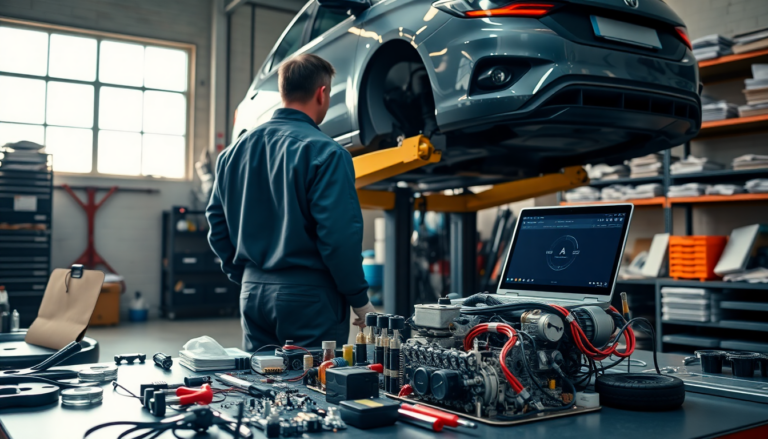Argomenti trattati
In today’s fast-paced world, grasping the fundamentals of automotive mechanics is more than just useful—it’s essential for anyone aiming to carve out a career in the automotive industry. From engine diagnostics to the fascinating world of electrical systems, mastering these basics can really set the stage for a successful future in automotive technology. So, what exactly should you know? This article takes a closer look at the core components of auto mechanics, spotlighting the skills and knowledge you’ll need to flourish in this dynamic field.
Core Principles of Engine Diagnosis and Repair
At the heart of automotive mechanics lies the engine—often dubbed the powerhouse of a vehicle. But how do you diagnose and repair engine issues? This process is nothing short of an art form, requiring a systematic approach to identify symptoms, analyze underlying problems, and implement effective solutions.
Engine diagnosis typically kicks off with a comprehensive examination of the vehicle’s performance. Mechanics utilize specialized tools and equipment to read diagnostic trouble codes, offering valuable insights into potential malfunctions. From there, a mechanic must dive deep into various engine components, including fuel systems, ignition systems, and exhaust systems, to pinpoint the issue. It’s a bit like detective work, isn’t it?
When it comes to repairing engine problems, both technical skill and a solid grasp of mechanical principles are essential. Whether you’re replacing faulty components or performing routine maintenance, understanding engine mechanics is a must. And as technology advances, mechanics need to stay updated on the latest innovations and repair techniques. After all, the automotive landscape is always evolving!
Electrical Fundamentals in Automotive Mechanics
Now, let’s shift gears and talk about the electrical system of a vehicle—it’s just as crucial to its operation. Understanding electrical fundamentals is key for diagnosing issues related to lighting, starting systems, and onboard electronics. Mechanics must be comfortable reading schematics, using multimeters, and troubleshooting electrical circuits. Have you ever thought about how all those components work together?
Electrical diagnosis often involves checking the battery, alternator, and wiring for faults. Mechanics also need to grasp how various electrical components interact with one another, ensuring that all systems function in harmony. This knowledge is especially vital as vehicles become increasingly reliant on sophisticated electronic systems and computer technology.
Furthermore, with the rise of electric vehicles, mechanics must be ready to adapt and expand their expertise to include hybrid and fully electric systems. This shift in automotive technology isn’t just a challenge; it’s a golden opportunity for those willing to learn and grow.
Steering, Alignment, and Brake Systems
Beyond engines and electrical systems, being proficient in steering, alignment, and brake systems is absolutely essential for any mechanic. These systems are pivotal for the safe operation of a vehicle and require regular inspection and maintenance—after all, safety is non-negotiable!
Steering and alignment directly impact a vehicle’s handling and tire wear. Mechanics must understand the mechanics of steering systems and the significance of proper alignment to ensure optimal performance. Recognizing symptoms of misalignment, like uneven tire wear or pulling to one side, is critical, as is knowing how to adjust them effectively. Ever experienced that unsettling pull while driving?
And then there are the brakes—arguably one of the most critical safety components in any vehicle. Understanding the different types of braking systems, from disc to drum brakes, is fundamental. Mechanics must be adept at diagnosing brake issues, replacing worn components, and making sure that the braking system operates efficiently and safely. It’s all about keeping the driver safe on the road!
Practical Advice for Aspiring Automotive Technicians
If you’re looking to jump into the world of automotive mechanics, gaining practical experience is invaluable. Enrolling in a comprehensive automotive technology program can lay the foundation you need for success. Many programs include hands-on training, allowing students to roll up their sleeves and work on real vehicles while gaining practical skills. How exciting would that be?
In addition to formal education, aspiring mechanics should actively seek internships or apprenticeships to gain real-world experience. This exposure not only hones technical skills but also provides insight into the day-to-day operations of an automotive repair shop. Networking with industry professionals and staying current on the latest trends in automotive technology can also give you a leg up. Have you considered joining online forums or attending workshops?
Future Outlook for Automotive Mechanics
The automotive industry is evolving at a breakneck pace, and the demand for skilled mechanics is projected to grow in the coming years. As vehicles become more complex, the need for technicians who can diagnose and repair advanced systems will only increase. This trend presents a promising outlook for those entering the field, especially for those who keep pace with technological advancements.
With the rising emphasis on sustainability and electric vehicles, mechanics who are knowledgeable about hybrid and electric technology will be in high demand. As the industry shifts, those with a solid foundation in both traditional and modern automotive systems will be best positioned to succeed. Are you ready to take on the challenge?

